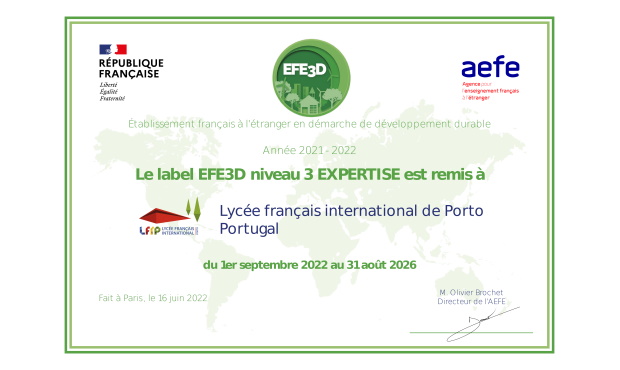

After its commitment, in 2014, to reflect upon and to implement actions aiming to make our school an eco-friendly institution, LFIP is now proud to present, since 2015, the “Green Flag” (awarded by the European Blue Flag Association) and has also obtained, in 2018, the E3D Certificate level 2 (awarded by Académie de Toulouse), confirmed in 2022 by obtaining the EFE3d Certificate
Currently, LFIP is a school which works towards Sustainable Development and all the members of our community (teaching teams, students, administrative and technical staff, parents and partners) are involved in this project. It is important to point out that this state of mind goes far beyond the school precinct.
Therefore, LFIP - already a teaching model at local level - adopts this commitment of sustainable development which is of general interest.
Our commitment is not limited to an environmental and ecological approach since our various actions follow the UN’s Sustainable Development Goals (SDG).
Specifically, the main lines of action defined by the CESC (Comissão para a Educação à Saúde e à Cidadania – Committee for Education towards Health and Citizenship):
- Cover three main areas:
- Environment – Ecology – Biodiversity;
- Rational consumption – Waste management;
- Citizenship and solidarity;
- Implemented (among others) by the Conselho Eco-Escola (Eco-School Council) and the CVL with the help of:
- Diffusion of information, thanks to the intervention of professionals, specialists or partners;
- Training not only for students but also for staff and parents;
- Workshops and activities which involve the students in the project.
Thanks to this organisation,
- Throughout his/her school life at LFIP, from Pre-Primary School to 12th grade, each student is oriented towards the concept of sustainable development and then, is encouraged to become an active participant in the process;
- All the services and all the members of the educational community play an active role on the project according to their work areas;
- Since 2014, we have implemented 120 initiatives, of which 59 became regular activities.








